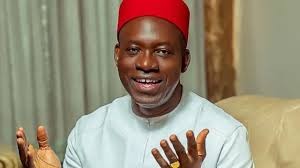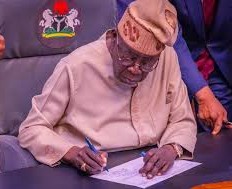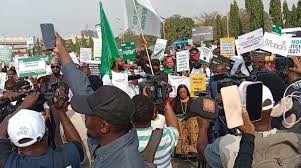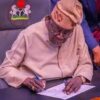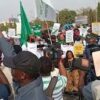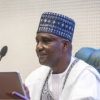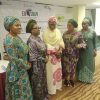With the Anambra off-cycle governorship election scheduled for November 8, 2025, residents are preparing to elect a new governor. Political analysts and stakeholders have noted an increase in the dissemination of false information by politicians during the lead-up to the election. The Anambra election, scheduled for 2025, will feature candidates from 16 political parties. Notable
With the Anambra off-cycle governorship election scheduled for November 8, 2025, residents are preparing to elect a new governor. Political analysts and stakeholders have noted an increase in the dissemination of false information by politicians during the lead-up to the election.
The Anambra election, scheduled for 2025, will feature candidates from 16 political parties. Notable among these are the All Progressives Grand Alliance (APGA), the current ruling party in the state with Governor Chukwuma Soludo seeking a second term, and the All Progressives Congress (APC), which is the ruling party at the federal level. This election is particularly significant as it is the only off-cycle gubernatorial contest in the country for this year.
Apart from being the only off-cycle election in the country in 2025, the election will play a significant role in the assessment of democratic stability in the South-East and indicate whether future governance will effectively address ongoing economic, social, and security issues.
As the polls approach, politicians and their supporters are spreading false information to shape their narratives. Information disorder, as seen in past elections, may influence the outcome of the Anambra poll.
False or manipulated information has been used as a political tool in past elections, and the 2025 Anambra gubernatorial election is no different, with recent instances of false stories debunked. This article examines common disinformation tactics to watch for during the election and their possible effects on the results.
False Information of Candidates Stepping Down
In the lead-up to elections in Nigeria, there have been recurring reports of false information regarding major candidates allegedly withdrawing from the gubernatorial race, particularly shortly before voting begins. In previous elections, similar claims were circulated about candidates from major political parties stepping down in favour of other contestants, which led to confusion among voters and supporters.
During the 2024 Edo state off-cycle governorship election, a rumour circulated that Labour Party candidate Olumide Akpata had withdrawn to support Peoples Democratic Party’s Asue Ighodalo. Akpata later denied this on his official X handle, confirming he had not stepped down for any candidate.
False reports about major candidates withdrawing or supporting rivals can mislead undecided voters and confuse them, especially in Anambra’s polarised politics. Such disinformation may greatly influence outcomes in close elections.
Electorates in Anambra must watch out for this kind of false information as the election is coming close, as it tends to create confusion and misleading narratives in the Anambra election.
Misinformation Related to the Biafra/IPOB Narrative
Disinformation regarding Biafra separatist activities and the Indigenous People of Biafra (IPOB) constitutes a significant narrative contributing to misinformation during the Anambra election. Historical incidents in the south-eastern region have demonstrated that unverified information has been disseminated, resulting in heightened tension and voter apathy.
For example, the Nigerian Democratic Reports published a fact-check report that refuted a misleading assertion claiming individuals identified as pro-Biafra agitators are gaining increased influence in Anambra State by organising gatherings.
The claim involved a video featuring Comrade Chioma Ifemeludike, the African Action Congress candidate in the upcoming election, who led a group in protesting at the state government house over concerns about insecurity. However, she was subsequently characterised as a pro-Biafra agitator, allegedly influencing the region and linking the demonstration to separatist activities.
This claim brought attention to the security of state elections, considering the ongoing activity of the separatist movement in the region.
Another claim about the pro-Biafra movement ahead of the Anambra election has recently emanated, in which there are rumours that the Biafra agitators are preparing to conduct their elections on November 4th, 2025, just a few days before the gubernatorial elections.
Recall that similar claims surfaced in the media ahead of the 2021 elections in Anambra State, which later raised political tension and voter apathy in the state. A clear example of this was a general claim that some ad-hoc staff of the Independent National Electoral Commission had terminated their appointment en masse over IPOB-linked threats ahead of the governorship election in the state in 2021. However, the electoral
INEC’s Resident Electoral Commissioner in Anambra State, Nwachukwu Orji, refuted the claims, stating that it was misleading.
Another claim before the 2021 election in the state was the rumour that the IPOB had declared a sit-at-home on the election day, reducing the participation level in the state, thereby causing low participation and a reduction of voter confidence and turnout.
Meanwhile, as the coming election approaches, there is a possibility of the same issues repeating themselves, causing voter apathy and low participation stemming from the fear of violence. The residents must look out for similar claims as the day of the election approaches.
Sharing of Out-of-Context Media Context
Another disinformation trend that could be used to possibly undermine the credibility of the elections, the candidates and the electoral commission ahead of the election is the circulation of videos, photos or audio clips and AI-generated content to portray either candidates or INEC in a bad light.
Presently, some of these are already circulating in the media as independent fact-checking organisations are fact-checking these claims. For instance, a claim was making the rounds on social media early this month that the Anambra state Governor, Charles Chukwuma Soludo, had directed all hotel proprietors to reserve all rooms from 4 to 9 November 2025 for government guests during the gubernatorial election on 8 November 2025, based on a memo dated 18 September 2025. The claim, which was backed up by an internal memo, was later discovered to be misleading.
These media outlets have a propensity to distort the election narrative to portray a lack of integrity, among other consequences that may result from inaccurate information. Some of these claims, once they get into circulation, either create fear or irreparable damage to the electioneering process.
Fake Election Results
One of the most common disinformation tactics employed by fake news peddlers during the election is the circulation of the election results not published by the electoral commission. Just like it has been witnessed in past elections, where there are several results of voting on social media before the electoral commission eventually declared the winner of the said post.
In 2021, during the Anambra election, there was a fake result which was circulated in some parts of the state, leading to a protest in Nnewi North Local Government Area of the state. Apart from this, there have been cases where the security agencies have issued strong warnings to the populace about the danger of circulating fake results during the election hours, as it can distort the voters’ behaviour and influence their decision, thereby undermining the legitimacy of the election.
The phenomena mentioned above have been identified as potential channels for disinformation that could affect the Anambra elections. The media, the electoral commission, and the public should remain vigilant and address false information through methods such as debunking and pre-bunking.
Furthermore, all stakeholders must be vigilant in scrutinising information in public spaces before sharing it to avoid falling victim to false information surrounding the elections. Verification of sources and double-checking would play a pivotal role in the integrity of the election.

